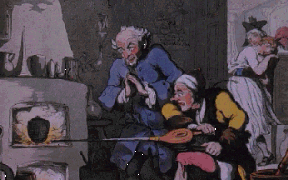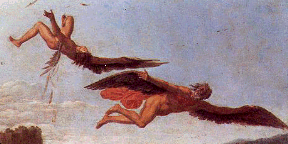



 |
 |
|
|
|
Mad scientists or nutty professors ?
Hollywood is some kind of a mirror of our society. And, as mirrors also
do, sometimes returns deformed images of reality. When a successful topic
is exhausted, producers at “The Industry “ will switch it into parody or
cartoons. In “The nutty professor” Jerry Lewis made the best known modern
caricature of a nerdy crazy scientist, in a play directly taken from the
story of Dr. Jekyll and Mr. Hide. We have also seen many cartoons on the
topic.
And what about mad scientists ?. Those are always bad guys about to
conquer the world all by themselves or at most with the help of a few merely
instrumental assistants.
These stereotypes are so heavily deformed that they are just a matter
of fun entertainment. But there are other stereotypes of science and scientists
with more subtle implications
Old Classics
 Dr. Victor Frankenstein has been a perfect example of mad scientist ever
since he was created by Mary Wollstonecraft Shelley in 1818. His daring
to reach for the spark of life cost him the punishment of destiny in the
hands of his own living creation.
Dr. Victor Frankenstein has been a perfect example of mad scientist ever
since he was created by Mary Wollstonecraft Shelley in 1818. His daring
to reach for the spark of life cost him the punishment of destiny in the
hands of his own living creation.
He was not alone, Dr. Jekyll also suffered nature’s revenge. In this
case it was on his own person, in the form of the now well-known potion-induced
double personality.
These two characters share many common characteristics. Both were in principle dedicated scientists with good intentions, both worked on philanthropic projects but in isolation from the common human world and of course both were surpassed by the results of their work.
The moral behind these stories is clear, as they warn us of what could
happen when we try to outsmart our Mother Nature and dare to uncover her
dearest secrets. As a true Victorian mother, Nature will punish us.
Older Classics
But when it comes to inventing punishments for daring humans, humans have shown an extremely old tradition. As a matter of fact we can find many such stories in the classics, the old Greeks for example, even before science as we know it was invented. It was the time when gods ruled the world and controlled the fates of all mortals.
Prometheus was not a god, just a titan; and he was also a friend of
human kind. During the hard times of creation he favored our species over
the rest of living beings by giving us the superior upright position and,
as it is better known, by stealing the Sun’s fire and bringing it under
our control. Oh boy... that made Zeus really mad !. Probably you know the
terrible punishment Prometheus had to endure forever (tied up with chains,
an eagle would rip him off over and over again and he wouldn’t die). I
guess he could have reached our days being attacked by the eagle if it
wasn’t for the help of Hercules who finally killed the persistent animal
(the eagle). By the way, Frankensteins’ story was inspired in Prometheus’.
In fact, the full title of Mary Shelley’s novel was “Frankenstein or the
Modern Prometheus”. As you can see some ideas stick hard to our collective
mind.
Knowledge, power and punishment
But let us leave Prometheus finally resting in peace and see what we
can remember of another classical tale. I would like to tell you more about
the story of a young daring man called Icarus. You probably first knew
about this mythological character by his wings.
Icarus was the son of Daedalus, a mythical Greek architect-sculptor-inventor.
It is a long story (you can learn more about it in the related story...
“The flight of Daedalus”), but the fact is that Daedalus and Icarus
were prisoners of King Minos of Crete. To escape the island Daedalus designed
suitable wings for him and his son, and made them with feathers and wax.
Icarus was instructed in the use of those liberating wings by his father.
Together with the instruction manual Icarus got a severe advice from his
father. He should not fly too high in the skies for the sun could melt
the wax. The technology was ready and the inherent dangers were too. Sure
enough our young and daring Icarus was carried away by the pleasure of
flight (a pleasure many of us enjoy these days), defied the warnings and
lost his life.

Like Prometheus, Icarus ventured into the forbidden kingdom of knowledge.
Knowledge that gave them power; a power that got out of control and was
the cause of their ultimate punishment.
Is it over ?
We have seen how old the stories of humble mortals playing god are.
But those are very old stories. We live in the days of light. The gods
have long ago declined responsibility for the fate of human kind which
is now on our own hands. So we could confidently expect a different social
attitude towards the pursuit of knowledge.
But the pursuit of knowledge implies reaching for the unknown, and
the unknown has always conveyed fear to our super-ape brains.
From time to time, when we go to the movies or watch TV, we will be reminded of the terrible consequences hiding around the corner of the next scientific breakthrough. We will horrify before the pitiful “half-scientist-half-insect” monster in “The fly” and will join the skeptic crowd after “experiencing” the Lost World of Jurassic Park.
We have always had and will always have this kind of tales because, as I was telling you, MAD Scientists never die.
![]() Back to main page on Science Technology and Society
Back to main page on Science Technology and Society